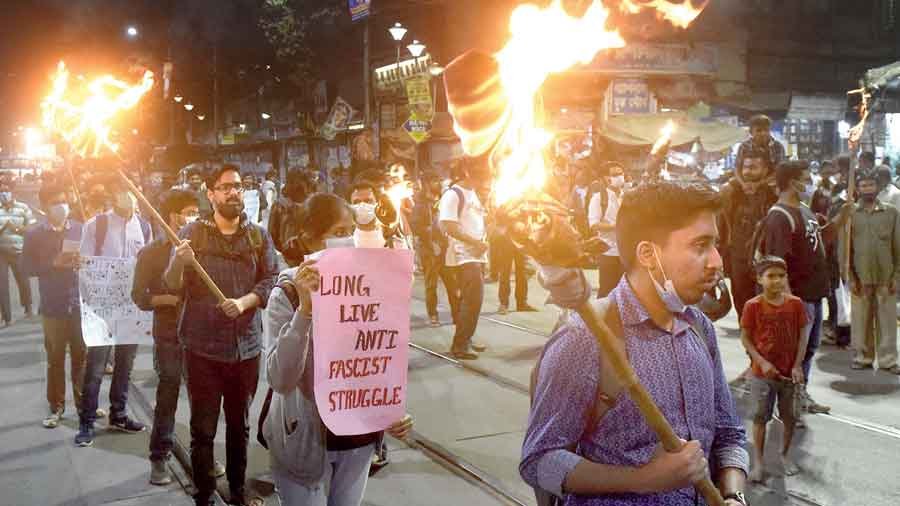Ownership or discarding hijab should be an individual choice; government has no business forcing a choice on Muslim women, say students
DEBRAJ MITRA: The image of a group of young men in saffron scarves chasing a college student over her attire is a mirror to today’s India, said students in Kolkata who took to the streets on Sunday to close ranks with Bibi Muskan in Karnataka.
The image was not made in a day, nor should it be seen in isolation, they said. It was similar to several images from the recent past — like that of a Union minister garlanding eight men convicted of lynching a Muslim trader on suspicion that he was transporting cows or that of Shambhulal Regar stabbing and burning Afrajul Khan for the ‘offence of love jihad’ and filming it live.
“All these images project an India where minorities are being subjected to repeated public trials. Everyone in the saffron ecosystem, from (Rashtriya Swayamsevak Sangh chief) Mohan Bhagwat to Narendra Modi, are responsible for this situation,” said Debraj Koley, a student activist.
He was one of the speakers at a protest meeting on College Street on Saturday evening. The meeting was followed by a march with flaming torches. The participants comprised current and former students of Calcutta University, Presidency University, Jadavpur University and other educational institutions in and around the city.
Several participants at the rally said their take on the hijab row was simple — resist hijab if it is forced upon you and defend hijab if you consider it to be your right. A government helmed by Right-wing leaders with “abysmal track record in women’s rights” had no business forcing a choice on Muslim women, they said.
“Ownership or discarding (of hijab) should be an individual choice. A majoritarian government has no business forcing a choice on Muslim women. Hindu mobs instigated by these leaders had killed pregnant women with tridents during the Gujarat riots. Their supporters brought out a rally openly supporting people accused of raping an eight-year-old girl inside a temple in Jammu. We don’t need lessons on women empowerment from them,” said Bandana Mondal, a former Presidency University student and now a part-time lecturer of physiology.
A short play based on Adab, a story by Samaresh Basu, was enacted in front of Coffee House. Adab tells the story of a chance meeting between two persons desperate to stay alive in a city ravaged by communal riots.
Multiple speakers said the State’s job was not telling women what to wear and what not to wear. The State’s job is to provide education and jobs to its people, they said.
Aditi Das Mahapatra, a second-year student of sociology at a city college, said the hijab row threatened to shut the doors of education to many women. “The pandemic has already had a disastrous impact on the education of marginalized students. Who will take the responsibility even if a section of these girls stops going to schools or colleges because of the hijab controversy?” she asked.

